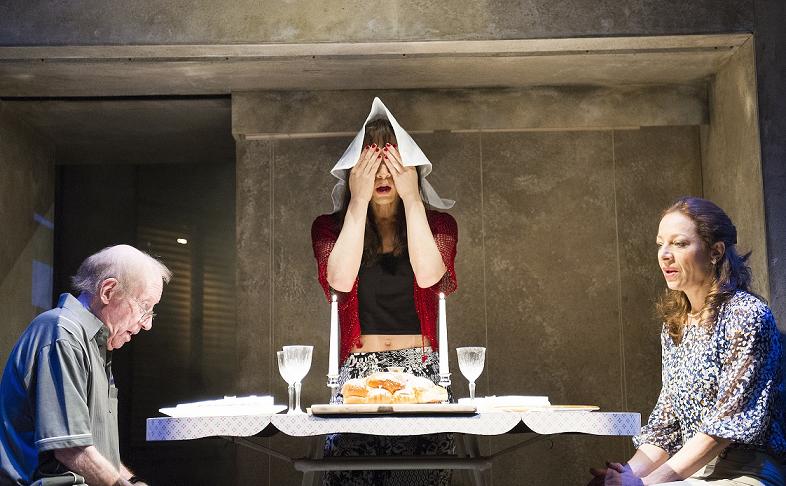Five male Filipinos in Tel Aviv live double lives. By day, they care for dying Orthodox Jews; by night, they are a drag act, the Paper Dolls. Based on real life, this play tells an incredible story that must be heard. Unfortunately, this production is not necessarily the one to tell it.
The story conveys how connections can be forged between clashing cultures. Elderly Jewish men and young Filipino transsexuals can have the same values; the same need for a sense of home; the same longing for companionship. Somewhere here is a heartbreaking, poignant play, focusing on one of this drama's many threads: the relationship between Sally Salvador, a conscientious carer, and his patient Chaim, who has throat cancer.
'Hava Nagili' segues surprisingly well into 'Lady Marmalade'
The best scenes in this production show the tender moments between the pair as Sally answers Chaim's phone or says a Hebrew blessing, while Chaim struggles with losing his independence. Chaim's daughter, visiting from New York, is jealous of Sally's relationship and confused by his sexuality. Francis Jue as Sally (pictured below, centre) and Harry Dickman as Chaim (pictured below, left) have terrific chemistry, but Caroline Wildi as Adina (pictured below, right) could do with lowering her hysterical intensity occasionally.
Playwright Philip Himberg has adapted Paper Dolls from Tomer Heymann's documentary film, itself cut from a six-part TV series. Perhaps this explains the cluttering of storylines. The main narrative is the care workers' search for fame as the Paper Dolls, but Himberg tries to pack in a lot more, from their individual lives to their attitudes towards immigration. Every conversation also seems to add an often inconsequential conflict between characters.

On the music side, “Hava Nagili” (the Jewish folk song popular at weddings) segues surprisingly well into “Lady Marmalade” (popularised by All Saints); and there is a joyful rendition of Cyndi Lauper's “Girls Just Want To Have Fun”. The rest of the karaoke tunes could go. The Israeli songs, including “Hatikvah” (the national anthem) and “Oseh Shalom” (a prayer about peace) are considerably richer.
Indhu Rubasingham's direction is fast and punchy, with Richard Kent and Oliver Fenwick working together on the set and lighting design to create numerous scenes: from a gay club to various homes to the Wailing Wall. The vibrant wigs, swimwear and tutus make Joseph's Technicolor dreamcoat seem drab, although Paris Fashion Week this is not.
The camp melodrama of the Paper Dolls might ring true in a documentary, but on stage, it irritates. Dickman and Noa Bodner – the latter playing the open-minded friend of the cameraman's mother – are the only actors that convince. Considering this story is based on real lives, it would have been good for there to have been more of that.












Add comment